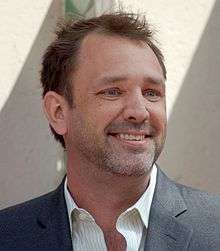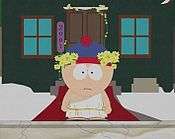Stan Marsh
Stanley "Stan" Marsh is a main character of the animated television series South Park. He is voiced by and loosely based on series co-creator Trey Parker. Stan is one of the show's four central characters, along with Kyle Broflovski, Eric Cartman, and Kenny McCormick. He debuted on television when South Park first aired on August 13, 1997, after having first appeared in The Spirit of Christmas shorts created by Parker and long-time collaborator Matt Stone in 1992 (Jesus vs. Frosty) and 1995 (Jesus vs. Santa).
| Stan Marsh | |
|---|---|
| South Park character | |
 | |
| First appearance |
|
| Created by | Trey Parker Matt Stone |
| Voiced by | Trey Parker |
| In-universe information | |
| Full name | Stanley Marsh |
| Aliases | Toolshed Billy |
| Gender | Male |
| Occupation | Former paperboy, student |
| Family | Randy and Sharon Marsh (parents) Shelly Marsh (sister) Sparky (dog) |
| Significant other | Wendy Testaburger (on-again, off-again girlfriend) |
| Relatives | Marvin Marsh (grandfather) Grandma Marsh (grandmother) Jimbo Kern (half-uncle) Aunt Flo (deceased great aunt) |
| Nationality | American |
| Residence | South Park, Colorado, United States |
Stan is an elementary school student who commonly has extraordinary experiences not typical of conventional small-town life in his fictional hometown of South Park, Colorado. Stan is generally depicted as logical, brave, patient and sensitive. He is outspoken in expressing his distinct lack of esteem for adults and their influences, as adult South Park residents rarely make use of their critical faculties.
Like the other South Park characters, Stan is animated by computer in a way to emulate the show's original method of cutout animation. He also appears in the full-length feature film South Park: Bigger, Longer & Uncut (1999), as well as South Park-related media and merchandise. While Parker and Stone portray Stan as having common childlike tendencies, his dialogue is often intended to reflect stances and views on more adult-oriented issues and has been frequently cited in numerous publications by experts in the fields of politics, religion, popular culture and philosophy.
Role in South Park
Stan lives in South Park at 2001 Bonanza Street with his parents Randy and Sharon Marsh. Randy is a geologist, and Sharon is a secretary at a rhinoplasty clinic. Stan's family includes his 13-year-old sister Shelly, who bullies and beats him, and his centenarian grandfather, Marvin, who calls Stan "Billy" and who previously begged Stan to help him commit suicide.[1] Stan attends South Park Elementary as part of Mr. Garrison's fourth grade class. During the show's first 58 episodes (1997 through the season 4 episode "4th Grade" in 2000), Stan and the other main child characters were in the third grade. His birthday is listed as October 19 (the same day as co-creator Trey Parker), 2001 on his Facebook page during the season 14 episode "You Have 0 Friends". Stan is frequently embarrassed and annoyed by his father's antics and frequent acts of public drunkenness.[2] Stan's relationship to his uncle Jimbo received moderate attention in the show's first two seasons.
The show's main characters usually have a defining characteristic: Kyle is the only Jewish kid, Cartman is an overweight sociopath, and Kenny is poverty-stricken and suffers violent deaths. However, Stan is portrayed as "a normal, average, American, mixed-up kid".[3]
Stan is modeled after Parker, while Kyle is modeled after Stone. Stan and Kyle are best friends, and their relationship, which is intended to reflect the real-life friendship between Parker and Stone,[4] is a common topic throughout the series. The two do have their disagreements, but always reconcile without any long-term damage to their friendship. As is the case with his other friends and classmates, Stan is frequently at odds with Cartman, resenting Cartman's behavior and openly mocking his weight.[5] Stan also shares a close friendship with Kenny, while Kenny professes that Stan is one of "the best friends a guy could have".[6] Stan can understand Kenny's muffled voice perfectly, and typically exclaims the catchphrase "Oh my God! They killed Kenny!", following one of Kenny's trademark deaths, allowing Kyle to follow up with "You bastards!"[7] Stan is the only character in the group to have had a steady girlfriend, Wendy Testaburger, and their relationship was a recurring topic in the show's earlier seasons. Despite reconciling and declaring to be a couple again in the season 11 (2007) episode "The List" after Wendy had dumped him in the season seven (2003) episode "Raisins", their relationship has received relatively less focus in recent seasons. As a running gag, a nervous Stan often vomits whenever Wendy approaches to kiss or speak to him.[8] In many episodes, Stan contemplates ethics in beliefs, moral dilemmas, and contentious issues, and will often reflect on the lessons he has attained with a speech that often begins with "You know, I learned something today...".[9]
Character
Creation and design

An unnamed precursor to Stan first appeared in the first The Spirit of Christmas short, dubbed Jesus vs. Frosty, created by Parker and Stone in 1992 while they were students at the University of Colorado. The character was composed of construction paper cutouts and animated through the use of stop motion.[10] When asked three years later by friend Brian Graden to create another short as a video Christmas card that he could send to friends, Parker and Stone created another similarly-animated The Spirit of Christmas short, dubbed Jesus vs. Santa, in which Stan also appeared.[11] Stan next appeared on August 13, 1997, when South Park debuted on Comedy Central with the episode "Cartman Gets an Anal Probe".[12]
In the tradition of the show's animation style, Stan is composed of simple geometrical shapes and primary colors.[10][13] He is not offered the same free range of motion associated with hand-drawn characters; his character is mostly shown from only one angle, and his movements are animated in an intentionally jerky fashion.[10][13][14] Ever since the show's second episode, "Weight Gain 4000" (season one, 1997), Stan, like all other characters on the show, has been animated with computer software, though he is portrayed to give the impression that the show still utilizes its original technique.[10]
Stan is usually depicted in winter attire which consists of a brown jacket, blue denim jeans, red gloves/mittens, and a red-brimmed blue knit cap adorned with a decorative red pom-pom. In the rare instances Stan is seen without his cap, he is shown to have shaggy black hair. He was given his full name in the season one episode "An Elephant Makes Love to a Pig", sharing his surname of "Marsh" with Parker's paternal step-grandfather.[2] While originally voicing Stan without any computer manipulation, Parker now speaks within his normal vocal range while adding a childlike inflection. The recorded audio is then edited with Pro Tools, and the pitch is altered to make the voice sound more like that of a fourth grader.[15][16]
Stan's birthday is October 19, which is also Trey Parker's birthday.[17]
Personality and traits

Stan is foul-mouthed (a trait present in his friends as well) as a means for Parker and Stone to display how they claim young boys really talk when they are alone.[13][18] In responding to certain situations, particularly during earlier seasons, Stan often exclaims "Dude, this is pretty fucked up right here". While Stan is cynical and profane, Parker still notes that there is an "underlying sweetness" to the character,[19] and Time magazine described Stan and his friends as "sometimes cruel but with a core of innocence".[4] He is amused by bodily functions and toilet humor,[4] and his favorite television personalities are Terrance and Phillip, a Canadian duo whose comedy routines on their show-within-the-show revolve substantially around fart jokes.
Stan is an avid animal lover. He is highly against his uncle Jimbo's hunting, and was also known to commit to vegetarianism after feeling compassion for baby calves in a farm, even going as far to hide them in his room to protect them from being slaughtered. Later, he was forced to quit vegetarianism because of a severe illness he developed, however, he still fights for animal rights, becoming a member of PETA in "Douche and Turd" as well as saving whales and dolphins in "Whale Whores".
The only adult on the show that Stan liked was Chef, the cafeteria worker at his school, as Stan generally holds the rest of the show's adult population in low regard due to their tendency to both behave irrationally when subjected to the scams, cults, and sensationalized media stories of which he is often skeptical,[9] and engage in hypocritical behavior.[20] He doubts the legitimacy of holistic medicine,[21] declares cults to be dangerous,[22] and regards those claiming to be psychic mediums as frauds,[23] specifically by declaring John Edward to be "the biggest douche in the universe".[24]
After turning ten years old, Stan was diagnosed with "cynicism",[25] which in the series is treated as a serious medical disorder where the sufferer sees nothing but feces instead of people and animals and hear flatulence noises during music and voices. Stan's friendships with the other main characters ended, his parents divorced and he moved out of his home. This episode formed a cliffhanger and set off widespread speculation that the series was coming to an end,[26] but the premiere of the second half of the season resolved the arc as Stan was erroneously diagnosed with Asperger's syndrome and discovers Jameson Irish Whiskey cures cynicism. After struggling to repair his life, he finally explains he doesn't want things to go back to normal, when his parents get back together and his life is repaired, although the end of the episode implies Stan may be permanently bound to whiskey to continue an everyday life.[27]
Cultural impact

In 2014, Stan was ranked by IGN at third place on their list of "The Top 25 South Park Characters", commenting that he "often acts as the voice of reason in the midst of the show's insane events, and in many ways he's more mature than his father Randy". The website concluded that "his history as one of the more stable and thoughtful characters in the series made him the perfect choice for the voice of Trey and Matt's own creative/professional frustrations".[28]
Stan frequently offers his perspective on religion,[29] and he was at the center of one of the most controversial episodes of the series,[30] "Trapped in the Closet" (season nine, 2005), where he was recognized as the reincarnation of Scientology founder L. Ron Hubbard before denouncing the church as nothing more than "a big fat global scam".[31]
In the show's twenty two seasons, Stan has addressed other topics such as homosexuality,[32][33] hate crime legislation,[34] civil liberties,[21] parenting,[35] illegal immigration,[36] voting,[37] alcoholism,[35] and race relations.[38] His commentary on these issues have been interpreted as statements Parker and Stone are attempting to make to the viewing public,[35] and these opinions have been subject to much critical analysis in the media and literary world. The book South Park and Philosophy: You Know, I Learned Something Today includes an essay in which East Carolina University philosophy professor Henry Jacoby compares Stan's actions and reasoning within the show to the philosophical teachings of William Kingdon Clifford,[39] and another essay by Southern Illinois University philosophy professor John S. Gray which references Stan's decision to not vote for either candidate for a school mascot in the season eight (2004) episode "Douche and Turd" when describing political philosophy and the claimed pitfalls of a two-party system.[39] Essays in the books South Park and Philosophy: Bigger, Longer, and More Penetrating, Blame Canada! South Park and Contemporary Culture, and Taking South Park Seriously have also analyzed Stan's perspectives within the framework of popular philosophical, theological, and political concepts.[35][40][41]
References
- Virginia Heffernan (2004-04-28). "What? Morals in 'South Park'?". The New York Times. Retrieved 2008-07-08.
- Jake Trapper and Dan Morris (2006-09-22). "Secrets of 'South Park'". ABC News. Retrieved 2009-04-18.
- "Stan Marsh". South Park Studios. Retrieved 2009-01-13.
- Jeffrey Ressner and James Collins (1998-03-23). "Gross And Grosser". Time. Retrieved 2009-04-28.
- "Eric Cartman – Characters – South Park Studios". www.southparkstudios.com. Retrieved 2009-07-23.
- Trey Parker and Matt Stone (2005-03-30). "Best Friends Forever". South Park. Season 9. Episode 904. Comedy Central.
- Kaplan, Don (2002-04-08). "FOXNews.com – South Park Won't Kill Kenny Anymore – Celebrity Gossip | Entertainment News | Arts And Entertainment". www.foxnews.com. Archived from the original on 2009-05-12. Retrieved 2009-07-23.
- Devin Leonard (2006-10-27). "'South Park' creators haven't lost their edge". CNN. Retrieved 2009-05-03.
- Arp and Jacoby, pp. 58–65
- Matt Cheplic (1998-05-01). "'As Crappy As Possible': The Method Behind the Madness of South Park". Penton Media. Archived from the original on 2009-03-29. Retrieved 2009-04-28.
- "Brian Graden's Bio". VH1.com. Archived from the original on 2008-01-20. Retrieved 2008-01-10.
- "South Park turns 10". theage.com.au. 2006-09-27. Retrieved 2009-07-23.
- Abbie Bernstein (1998-10-27). "South Park – Volume 2". AVRev.com. Archived from the original on 2013-05-15. Retrieved 2008-04-30.
- Jaime J. Weinman (2008-03-12). "South Park grows up". Macleans.ca. Archived from the original on 2009-08-02. Retrieved 2008-04-30.
- "South Park FAQ". South Park Studios. 2009-02-10. Archived from the original on 2009-05-11. Retrieved 2009-04-30.
- "40 Questions". South Park Studios. 2001-10-04. Archived from the original on 2010-11-29. Retrieved 2009-01-30.
- "You Have 0 Friends". South Park. 2010-04-07. Comedy Central.
- Jake Trapper and Dan Morris (2006-09-22). "Secrets of 'South Park'". ABC News. Retrieved 2009-04-18.
- Frazier Moore (2006-12-14). "Loud and lewd but sweet underneath". The Age. Retrieved 2009-05-09.
- Randy Fallows (January 2002). "The Theology of South Park". The Institute for the Study of American Popular Culture. Retrieved 2009-05-03.
- Brian C. Anderson (2003). "We're Not Losing the Culture Wars Anymore". Manhattan Institute. Retrieved 2009-05-03.
- "The brats take on religion". Chicago Tribune. 2006-03-22. p. 49.
- David Williams (2003-10-03). "Differences between a predator and prey". The Daily Barometer. Retrieved 2009-05-03.
- Trey Parker and Matt Stone (2002-11-27). "The Biggest Douche in the Universe". South Park. Season 6. Episode 615. Comedy Central.
- Trey Parker and Matt Stone (2011-06-07). "You're Getting Old". South Park. Season 15. Episode 1507. Comedy Central.
- Sepinwall, Alan (June 9, 2011). "'South Park' – 'You're Getting Old': Getting ready to say goodbye?". HitFix.
- Trey Parker and Matt Stone (2011-10-06). "Ass Burgers". South Park. Season 15. Episode 1508. Comedy Central.
- Ramsey Isler; Jesse Schedeen (2014-02-28). "The Top 25 South Park Characters". IGN. p. 5. Retrieved 2014-03-19.
- Douglas E. Cowan (Summer 2005). "South Park, Ridicule, and the Cultural Construction of Religious Rivalry". Journal of Religion and Popular Culture. Retrieved 2014-01-15.
- Todd Leopold (2006-08-24). "Welcome to the Emmy 'mess'". CNN. Retrieved 2009-05-03.
- Jake Trapper and Dan Morris (2006-09-22). "Secrets of 'South Park'". ABC News. Retrieved 2009-04-18.
- Tracy Baim (1997-09-16). "Snyde & Sneak". Lambda Publications Inc. Archived from the original on October 13, 2007. Retrieved 2009-05-03.
- Justine Hankins (2003-09-20). "Not so queer". The Sydney Morning Herald. Retrieved 2009-05-03.
- Frank Rich (2005-05-01). "Conservatives ♥ 'South Park'". The New York Times. Retrieved 2009-05-03.
- Fallows and Weinstock, p. 165
- Eric Griffiths (2007-06-21). "Young offenders". New Statesman. Retrieved 2009-05-03.
- Arp and Gray, pp. 121–128
- Vanessa E. Jones (2008-01-29). "No offense, but ..." The Boston Globe. Retrieved 2009-05-03.
- South Park and Philosophy: You Know, I Learned Something Today Archived 2007-09-01 at the Wayback Machine, Blackwell Publishing, Series: The Blackwell Philosophy and Pop Culture Series, Retrieved 2008-01-21
- Hanley, Richard (Editor) (2007-03-08). South Park and Philosophy: Bigger, Longer, and More Penetrating. Open Court. ISBN 0-8126-9613-1.CS1 maint: extra text: authors list (link)
- Johnson-Woods, Toni (2007-01-30). Blame Canada! South Park and Contemporary Culture. Continuum International Publishing Group. ISBN 978-0-8264-1731-2.
- Arp, Robert (Editor); Gray, John Scott; Jacoby, Henry (2006). South Park and Philosophy: You Know, I Learned Something Today. Blackwell Publishing (The Blackwell Philosophy & Pop Culture Series). ISBN 978-1-4051-6160-2.CS1 maint: extra text: authors list (link)
- Weinstock, Jeffrey Andrew (Editor); Fallows, Randall (2008). Taking South Park Seriously. SUNY Press. ISBN 978-0-7914-7566-9.CS1 maint: extra text: authors list (link)